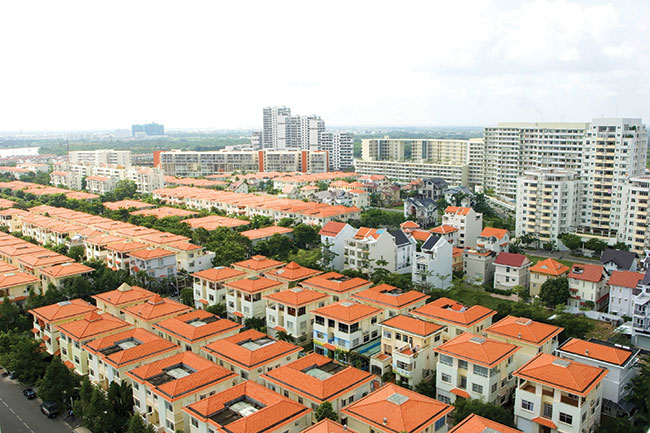PMH urged to dole out profits

PMH said that their decision not to share profits is crucial to keep the joint venture financially solvent
Photo: Le Toan
According to its statement released last week, Phu My Hung has decided not to distribute profits to the Vietnamese partner Tan Thuan Industrial Promotion Co. Ltd. (IPC), which are estimated at VND1,444 billion ($68.7 million) between 2010 and 2014, in order to relieve financial burden and re-invest in new projects.
According to Nguyen Buu Hoi, deputy general director of Phu My Hung, in 2014, the company contributed more than VND1,292 billion ($61 million) to the local city budget, making it one of the top five companies in terms of financial contributions.
To date, it has paid VND7,071 billion ($336 million) into the city’s coffers.
Up to 2010, IPC had received VND2,452 billion ($117 million) of profits.
Phu My Hung, which is the developer of the best-selling Phu My Hung New Urban Area in Ho Chi MInh City, revealed that the joint venture has so far contributed a total of VND15,323 billion ($729 million) to the city’s budget.
Hoi stated that the business activities of the joint venture became more difficult as the real estate market had faced hard times since the end of 2009. To improve service quality and attract new customers, the company had to invest heavily in large-scale projects such as The Crescent Mall, which required a total capital of VND2 trillion ($92 million).
In addition, following the prime minister’s instruction and Ho Chi Minh City People’s Committee in 2011, the joint venture has had to pay land use fees amounting to VND5.8 trillion ($277 million) for the 63-ha land plot, which it had yet to open for sale.
Hoi claimed that to relieve this financial burden, the company has mobilised all of the financial resources at its disposal. Although the business has shown signs of recovery from 2010 to 2014, the company has yet to rectify its own financial difficulties.
Therefore, its board of members reached a consensus on a 67 per cent vote that neither of the partners of the joint venture will receive a profit share for the hard times endured between 2010 and 2014.
“This decision was made based on sound business sense and the long-term interests of the joint venture,” Hoi said.
He added that if profits were to be given to both parties, the joint venture would have to operate on bank loans at 10 per cent interest per year, thus increasing the financial burden and reducing earnings in the following years.
He stated that the temporary decision of not distributing a profit share for both parties was appropriate based on the law.
As stipulated in Article 61 of the Law on Enterprises 2005, joint venture companies are only obliged to distribute profits to members if they generate a profit, fulfill taxation and other financial obligations, as well as guarantee the payment of all debts and due asset commitments.
“The distribution of profits will be implemented in line with the law, the joint venture contract, and the actual financial situation of the company,” Hoi stressed.
Phu My Hung is a joint venture between IPC, 100 per cent owned by the city’s administration, and Taiwan’s Phu My Hung Asia Holdings Corporation.
This joint venture was established in 1993 with a legal capital of $60 million, of which the local partner contributed $18 million for a 30 per cent share, while the foreign partner makes up the remaining 70 per cent.
Cases where foreign partners in a joint venture refuse to share profits are not rare in Vietnam. In previous cases where the foreign partners refuse profit sharing for several years, the Vietnamese partner is ostensibly forced to withdraw from the joint venture.
In order to make sure that this situation is not repeated, Ho Chi Minh City authorities have requested that the Ministry of Planning and Investment revise the regulation on profit sharing in joint ventures, stipulating that the profit must be shared for every year after the joint venture finishes its taxation and other financial obligations to the state budget.
What the stars mean:
★ Poor ★ ★ Promising ★★★ Good ★★★★ Very good ★★★★★ Exceptional
Latest News
More News
- Dong Nai experiences shifting expectations and new industrial cycle (January 28, 2026 | 09:00)
- An Phat 5 Industrial Park targets ESG-driven investors in Hai Phong (January 26, 2026 | 08:30)
- Decree opens incentives for green urban development (January 24, 2026 | 11:18)
- Public investment is reshaping real estate’s role in Vietnam (January 21, 2026 | 10:04)
- Ho Chi Minh City seeks investor to revive Binh Quoi–Thanh Da project (January 19, 2026 | 11:58)
- Sun Group launches construction of Rach Chiec sports complex (January 16, 2026 | 16:17)
- CEO Group breaks ground on first industrial park in Haiphong Free Trade Zone (January 15, 2026 | 15:47)
- BRIGHTPARK Entertainment Complex opens in Ninh Binh (January 12, 2026 | 14:27)
- Ho Chi Minh City's industrial parks top $5.3 billion investment in 2025 (January 06, 2026 | 08:38)
- Why Vietnam must build a global strategy for its construction industry (December 31, 2025 | 18:57)

















 Mobile Version
Mobile Version